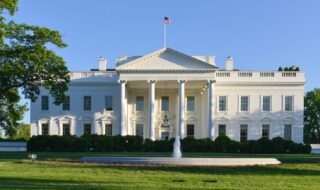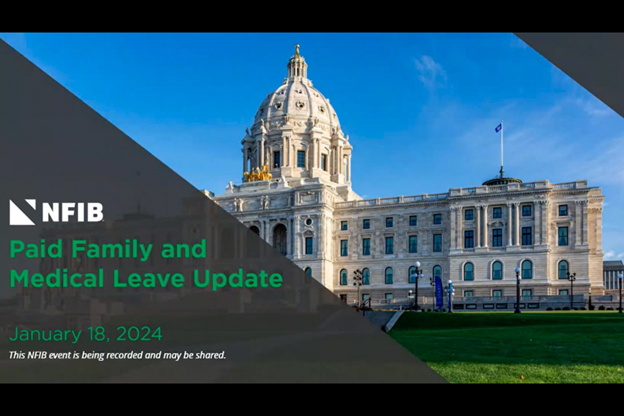Topics:
January 23, 2024 Last Edit: June 5, 2025
Job creators express their criticisms of and concerns with the new mandate.
WATCH: Small Business Owners Ask Questions, Express Concerns With New PFML Mandate During DEED Webinar
CLICK HERE to view the full webinar. FAQs may be found below.
During the webinar, NFIB State Director John Reynolds shared just a few reasons why job creators overwhelmingly oppose the PFML mandate, including the ongoing worker shortage, cost, and administrative burden. “NFIB opposed the paid family and medical leave program during the legislative session,” Reynolds said. “We argued a number of different ways about the negative impact it would have on our members. The top reasons being threefold. First, we’re in a chronic worker shortage and this poses a huge problem for our employers. The idea of finding replacement workers for up to 20 weeks per year is a daunting one for small businesses in particular. Second, an expensive new payroll tax comes with the program. And then finally, there are concerns about the administrative burden and the potential for abuse.” Reynolds continued, noting the importance of conveying these concerns to decision-makers at DEED. “We thought it was important for two reasons to have this webinar today,” Reynolds said. “One, it’s important for our members to understand the impact or potential impact that this program may have on their businesses. Two, it’s also important for our members to be able to share their perspectives with DEED. DEED is going to have to make a lot of decisions over the next couple of years as they build out and implement PFML. The more that we can share our perspective with them, the more that they can make decisions that ease or reduce some of the burden on our members.” NFIB MN will continue to serve as the voice of small businesses in St. Paul, advocating against harmful policy proposals and mandates. We will continue expressing small business owners’ concerns with the new program and suggestions to alleviate the program’s burden on our job creators. About the PFML Mandate: The program requires nearly all employers to allow nearly all employees with 20 weeks off per year for a wide range of reasons, including the employee’s medical condition, parental leave, or to care for family and anyone for whom the employee has an “expectation” to provide care. Program users will apply to and be paid via a state government agency and the program is funded by a new $1.5 billion per year payroll tax split between employees and employers. The details of the program will be worked out via regulation over the next two years. You can read more about the PFML law HERE. CLICK HERE to view the webinar. FAQs may be found below. CLICK HERE to view DEED’s PowerPoint presentation. Don’t forget to download the NFIB Engage App today to stay up to date with legislation that will impact your business at the state or federal level. If you have any questions, please contact NFIB Minnesota State Director John Reynolds at john.reynolds@nfib.org. Questions from the PFML Webinar: Small business owners are rightly worried about the impact PFML will have on their workforce and business operations. While some details of the program won’t be known until DEED finalizes regulations, below are answers to some of the commonly asked questions during the PFML webinar. Do I have to pay both the employee on PFML leave and the replacement I hire to continue the work?- No, the employee on leave will be paid through the state-run PFML program. Employers are responsible for continuing benefits – including health insurance – while the employee is on PFML. Where applicable, employers can continue to collect premiums for benefits from the employee on leave.
- have average receipts during one six month period of the preceding year that are no more than 33% of its average receipts for the other six month period of that year; and
- be a business identified in Minnesota Statute 157.15, Subd. 4-9 or 11-14.
State:
Get to know NFIB
NFIB is a member-driven organization advocating on behalf of small and independent businesses nationwide.
Related Articles

July 10, 2025
Historic Legislation Becomes Law and Stops Massive Tax Hike on…
The One Big Beautiful Bill Act is signed into law, permanently extending th…
Read More


July 10, 2025
LISTEN: NFIB LA Director Talks Insurance Reform, Tax Relief, an…
Leah Long legislation making the 20% Small Business Deduction permanent was…
Read More


July 10, 2025
NFIB Minnesota Reacts to New Optimism Report
NFIB Minnesota State Director Jon Boesche reacts to Small Business Optimism…
Read More


July 7, 2025
New Op-Ed Highlights Challenge of Political Stalemate for PA Sm…
NFIB’s Greg Moreland wrote about why small businesses need tax reform act…
Read More








